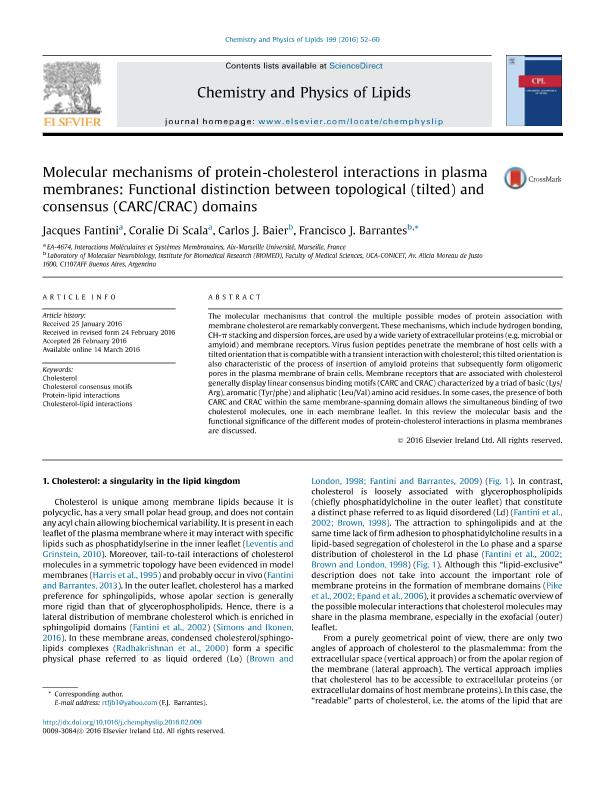Mostrar el registro sencillo del ítem
dc.contributor.author
Fantini, Jaques
dc.contributor.author
Di Scala, Coralie
dc.contributor.author
Baier, Carlos Javier

dc.contributor.author
Barrantes, Francisco Jose

dc.date.available
2018-03-13T20:30:30Z
dc.date.issued
2016-03
dc.identifier.citation
Fantini, Jaques; Di Scala, Coralie; Baier, Carlos Javier; Barrantes, Francisco Jose; Molecular mechanisms of protein-cholesterol interactions in plasma membranes: Functional distinction between topological (tilted) and consensus (CARC/CRAC) domains; Elsevier Ireland; Chemistry And Physics Of Lipids; 199; 3-2016; 52-60
dc.identifier.issn
0009-3084
dc.identifier.uri
http://hdl.handle.net/11336/38699
dc.description.abstract
The molecular mechanisms that control the multiple possible modes of protein association with membrane cholesterol are remarkably convergent. These mechanisms, which include hydrogen bonding, CH-π stacking and dispersion forces, are used by a wide variety of extracellular proteins (e.g. microbial or amyloid) and membrane receptors. Virus fusion peptides penetrate the membrane of host cells with a tilted orientation that is compatible with a transient interaction with cholesterol; this tilted orientation is also characteristic of the process of insertion of amyloid proteins that subsequently form oligomeric pores in the plasma membrane of brain cells. Membrane receptors that are associated with cholesterol generally display linear consensus binding motifs (CARC and CRAC) characterized by a triad of basic (Lys/Arg), aromatic (Tyr/phe) and aliphatic (Leu/Val) amino acid residues. In some cases, the presence of both CARC and CRAC within the same membrane-spanning domain allows the simultaneous binding of two cholesterol molecules, one in each membrane leaflet. In this review the molecular basis and the functional significance of the different modes of protein-cholesterol interactions in plasma membranes are discussed.
dc.format
application/pdf
dc.language.iso
eng
dc.publisher
Elsevier Ireland

dc.rights
info:eu-repo/semantics/openAccess
dc.rights.uri
https://creativecommons.org/licenses/by-nc-nd/2.5/ar/
dc.subject
Cholesterol
dc.subject
Cholesterol Consensus Motifs
dc.subject
Protein-Lipid Interactions
dc.subject
Cholesterol-Lipid Interactions
dc.subject.classification
Otras Ciencias Biológicas

dc.subject.classification
Ciencias Biológicas

dc.subject.classification
CIENCIAS NATURALES Y EXACTAS

dc.title
Molecular mechanisms of protein-cholesterol interactions in plasma membranes: Functional distinction between topological (tilted) and consensus (CARC/CRAC) domains
dc.type
info:eu-repo/semantics/article
dc.type
info:ar-repo/semantics/artículo
dc.type
info:eu-repo/semantics/publishedVersion
dc.date.updated
2018-03-13T18:15:34Z
dc.journal.volume
199
dc.journal.pagination
52-60
dc.journal.pais
Irlanda

dc.description.fil
Fil: Fantini, Jaques. Aix-Marseille Université; Francia
dc.description.fil
Fil: Di Scala, Coralie. Aix-Marseille Université; Francia
dc.description.fil
Fil: Baier, Carlos Javier. Consejo Nacional de Investigaciones Científicas y Técnicas. Centro Científico Tecnológico Conicet - Bahía Blanca. Instituto de Investigaciones Bioquímicas de Bahía Blanca. Universidad Nacional del Sur. Instituto de Investigaciones Bioquímicas de Bahía Blanca; Argentina
dc.description.fil
Fil: Barrantes, Francisco Jose. Consejo Nacional de Investigaciones Científicas y Técnicas. Centro Científico Tecnológico Conicet - Bahía Blanca. Instituto de Investigaciones Bioquímicas de Bahía Blanca. Universidad Nacional del Sur. Instituto de Investigaciones Bioquímicas de Bahía Blanca; Argentina
dc.journal.title
Chemistry And Physics Of Lipids

dc.relation.alternativeid
info:eu-repo/semantics/altIdentifier/doi/http://dx.doi.org/10.1016/j.chemphyslip.2016.02.009
dc.relation.alternativeid
info:eu-repo/semantics/altIdentifier/url/https://www.sciencedirect.com/science/article/pii/S0009308416300317
Archivos asociados
